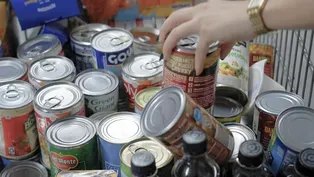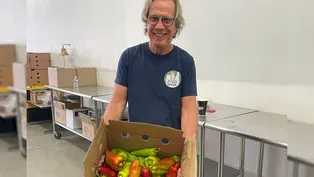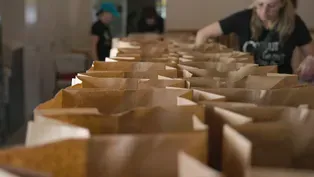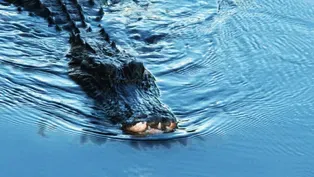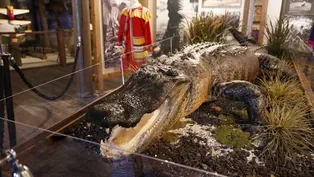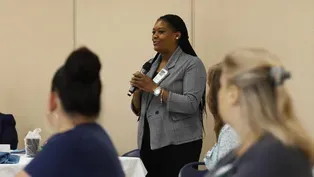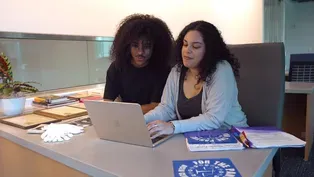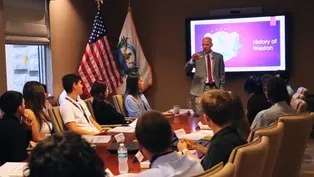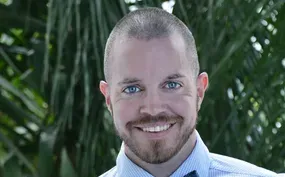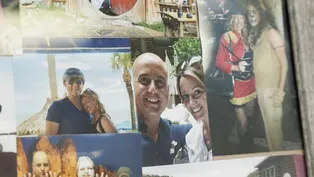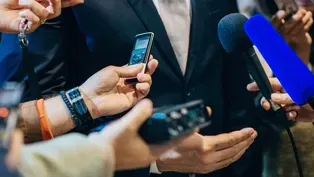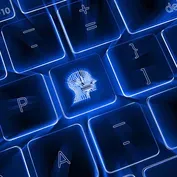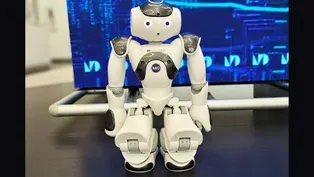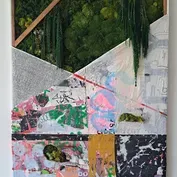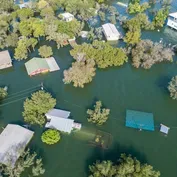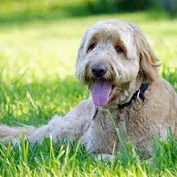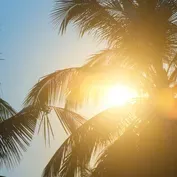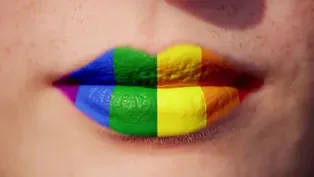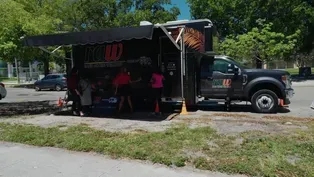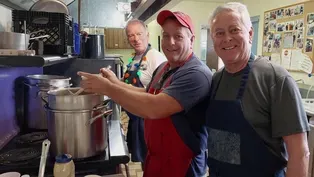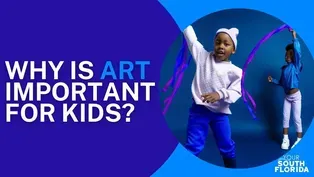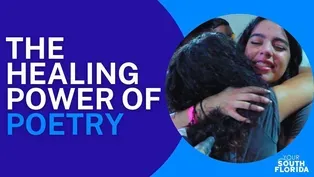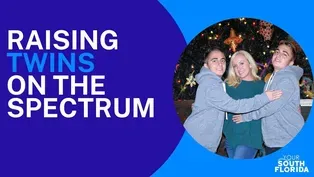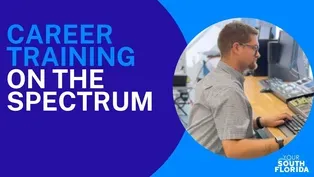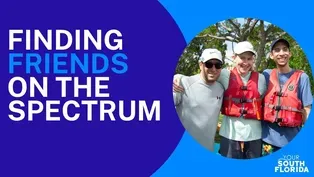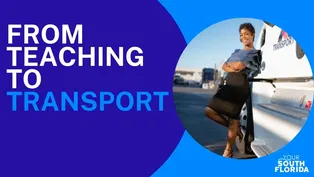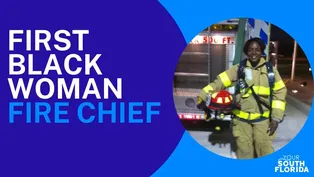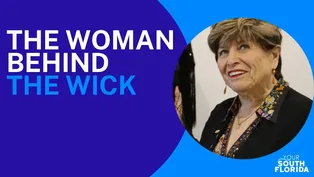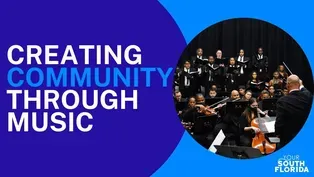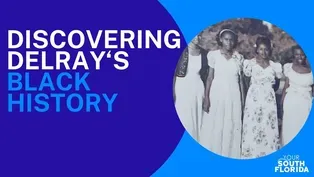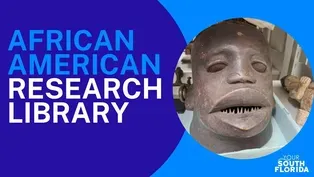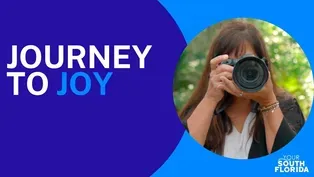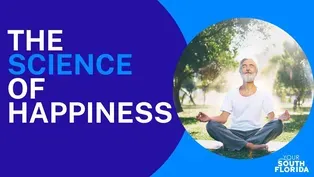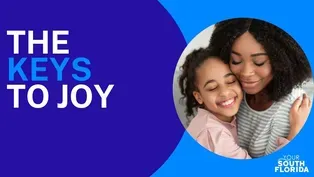Your South Florida
Inside Miccosukee Culture & History
Clip: Season 8 | 11m 10sVideo has Closed Captions
Pam Giganti interviews William ‘Popeye’ Osceola and Talbert Cypress about the Tribe’s history.
Host Pam Giganti sits down with Miccosukee Business Council Secretary William ‘Popeye’ Osceola, and Miccosukee Business Council Chairman Talbert Cypress, to hear about the Tribe’s history, culture and traditional art, the Tribe’s duty to preserve their native land in the Everglades, and the work being done to pass these traditions on to the next generation of Miccosukee.
Problems with Closed Captions? Closed Captioning Feedback
Problems with Closed Captions? Closed Captioning Feedback
Your South Florida is a local public television program presented by WPBT
Your South Florida
Inside Miccosukee Culture & History
Clip: Season 8 | 11m 10sVideo has Closed Captions
Host Pam Giganti sits down with Miccosukee Business Council Secretary William ‘Popeye’ Osceola, and Miccosukee Business Council Chairman Talbert Cypress, to hear about the Tribe’s history, culture and traditional art, the Tribe’s duty to preserve their native land in the Everglades, and the work being done to pass these traditions on to the next generation of Miccosukee.
Problems with Closed Captions? Closed Captioning Feedback
How to Watch Your South Florida
Your South Florida is available to stream on pbs.org and the free PBS App, available on iPhone, Apple TV, Android TV, Android smartphones, Amazon Fire TV, Amazon Fire Tablet, Roku, Samsung Smart TV, and Vizio.
Providing Support for PBS.org
Learn Moreabout PBS online sponsorshipThis gator is ironic because his name is Tiny.# As you can see.
Clearly he's not.
And he used to## be alive.
He used to be in our old alligator pit# before we got it refurbished and redone.
We had## a hard time disconnecting from Tiny, and we just# had to make sure we acknowledged our history and## we brought them up to the future.
Now with us.# And here he.
Is.
Exactly.
Thank you gentlemen,## it's great having both of you here today.
Really# appreciate your time.
Ppop, I want to start## with you.
We are here on the lovely Miccosukee# Indian Village on the Miccosukee Reservation.## Talk a little bit about the significance# of this land and why it is so important## to you and your people.
We're only here# because of this land.
It protected us.## It saved us during the war times.
In# fact, this village we're in right now,## there's actually some very important meetings# that were held here back in the day when we were## trying to become a federally recognized tribe.
And# this village used to actually belong to a family.# But once we became a tribe, they allowed the# tribe to use it to make sure we could do outreach## to people who weren't living in the Everglades# non-natives.
It’s a pretty, uh, pretty significant## place for that right now.
Talbott Let's talk# about the history of the Miccosukee and the## Seminoles.
We hear so much about the Seminole# Indians in the state of Florida.
Talk a little## bit about both of those tribes, the significance.# And is there collaboration between the two tribes?
Well, the history goes back to pretty much the# Seminole Wars, where we banded together with## the Seminoles.
Seminole was actually derived# from a Spanish word, Seminole, and it became## Seminole to the Seminole people.
It's actually# not an Indian word.
Um, but they lumped us all## in as Seminoles during the Seminole Wars.
And so# we came down here.
Um, you know, uh, they were## recognized back in 58 or somewhere around there# in the 50s 5757.
And then we requested for the## government that we wanted to be recognized as our# own tribe.
Um, because we had some cultural and## political differences.
When that happened, the# two tribes pretty much split.
We were recognized## as a separate tribe.
And right now, you know,# we share family and all that.
We have a really## good relationship with the Seminole tribe now.# Excellent communication and collaboration on## different things to especially the environment.# Which is so important.
I know that's really been## a focus for you, Popeye, lately.
And we'll# talk a little bit about that in a moment.# But you're the youngest member of the Business# Council.
You were a teacher for a really long## time.
You're an artist.
You've been really focused# on the youth and education.
Talk a little bit## about the importance of working with the young# people and teaching them your culture, but the## juxtaposition of living in the modern world.
How# do you do that?
It's of the utmost importance that## we focus on the young people because they're the# only reason we're going to have a future.
It's the## legacy that we need them to carry on.
And I know# growing up, I remember my grandparents being very## involved when I had questions.
They help give me# a lot of guidance and I see how I benefited from## that guidance.
So I had to make sure we passed# it on to the next generation.
That's the only## reason we're here, because we have that in our# tradition.
Young people teach old people and it's## a whole lifelong endeavor.
So you always have# to stay connected.
Throughout our whole life,## we actually have a embassy fellowship program# right now that we started recently, and that is so## high school and college graduates in the tribe, we# can train them a little bit more in-depth on the## tribe's history, how our government functions, how# tribes have function when the American government.# So that way they can speak upon the tribe's# history, whether it's to the general public or## to elected officials or whoever needs to know more# about the tribes so we can get done what we need## to get done.
We're trying to make sure these young# people realize they have a place and that they are## of value.
Talk a little bit about the relationship# between the Miccosukee and the Gators.
So from## time to time, you know, hard times, sometimes# gators will be hunted.
So that way there's## sustenance for us.
As they built the highway.# When our people were hunting, they noticed, hey,## these non-natives driving past, they're stopping# to watch us hunt the gator.
That's when we started## doing alligator wrestling, which was adapted# from traditional gator hunting techniques,## but obviously so we could keep the gator# alive now.
And that's where this whole sport## of alligator wrestling started, which it's really# more of a show, not so much a sport, but it gives## us an opportunity to stay connected with nature# and to teach others outside of here how nature is,## because these guys are incredibly misunderstood.
And it's also a reminder that no matter how much## you think things are in control, nature is still# able to win.
You as the Miccosukee have been in## this area and in the Everglades.
The modern world# out there is continued to evolve.
So talk about## what some of the biggest challenges have been for# the tribe and the rest of, say, South Florida,## for example.
Well, it's a lot of it's encroachment# and also water quality, right?
Um, and I think## that's become a bigger issue now as more people# have moved to Florida, they're beginning to## recognize the importance of the Everglades.# That's where they get their drinking water## from and everything.
I think people are starting# to hear our voice a little more on that.
You know,## we've been raising the alarm for a long time, and# it's good that people are starting to listen now,## and we're ready to educate.
Them as well.
We're# putting more effort into outreach and educating## government officials, because there's a lot of# important decisions that are about to be made.# For example, the wilderness designation# of Big Cypress, that's an issue that's## ongoing wilderness.
The way this country# approaches it basically says that, oh,## this piece of land we want to designate as# wilderness, it's no habitation by people,## no impact by people basically saying that# there is no history of humanity there.
And## we've been living in Big Cypress for centuries.# My grandmother Peggy, she's about she's almost## 100 years old.
She lives in a camp still.
And# to think like they want to disconnect her and## us from that land and act like we haven't# been present, like she was born out there,## not in a hospital.
It's important that we let# people know what's really at stake, because a lot## of people don't understand that we don't have Big# Cypress accessible to us.
That's where we hold our## ceremonies.
That's where we get medicine.
That's# where we get resources to build our homes, our## traditional homes, our chickens and things like# that.
If the Everglades is not helped, if it's not## cleaned up, those aquifers, they get polluted.
Millions of millions of South Floridians are## going to be out of water.
So that's like high# level stuff.
We have to keep in mind.
It's not## just us we're trying to protect and benefit# from.
It's the outside population as well that## we're looking out for in the end.
Talk about how# important Miccosukee Day was to the tribe.
It's## acknowledging our existence and our history, which# is often undercounted in modern times.
I mean,## a lot of people don't even know that we're still# around.
For the mayor to make this type of change## and especially the other county commissioners,# it's nice because it's a culmination of a lot## of the work our people have been doing.
Those# who were here before us and all the outreach## and education.
It's also a nice indicator that# we're moving past mythology and starting to## get into actual history, that's always the# most important thing to us.
Acknowledge the## actual history.
Let's talk a little bit about# the misconceptions that you think the outside## non-native world has with the Miccosukee Tribe.
The most common one, and that's why we have a## village, is because they think we live in Ttp's.# Or actually, you'd be surprised because I've## done a lot of traveling through the country and# people are like, Oh, what are you?
I always try## to describe myself as a human first, and people# don't like that.
When I get to describing myself## as Miccosukee, it's like, Oh, you're native.
And# sometimes you'll be like, Oh, we thought you were## all dead.
It’s to that level.
Yeah.
And we have# a different way of philosophy.
The way we look## at life.
For example, we have gaming.
But that's# only so we can fund everything we're doing here.## As far as trying to protect the environment.
It's# actually in our Constitution.
We have to conserve## the land and resources for future generations.# So that's what everything is going towards.
And## a lot of people think we're doing gaming just# because we want money.
It's like, no, we need## that to keep doing the important stuff.
That's# just the means to an end.
You are an artist.# Paipai somewhat.
Yeah.
No You are.
I've seen your# work.
Talk a little bit about Miccosukee culture## and some of the artistry that is on display.
That# is really quite beautiful.
Well, I like to think## in some ways art saved us because that's what you# really saw.
Are people developing when they were## left in peace here after the war times, that's# when you saw stuff like patchwork being developed,## Palmetto's dolls beating and stuff like that came# a little bit later through trading or whatnot.## We teach that to our students at the school# in the Miccosukee Language Arts Department,## because we want to make sure they have that skill# because like if you look at like the Patrick here,## this was developed out here in the swamps and# it's informed by our existence out here in## the Everglades.
Trent, we're here with your# beautiful beating, this beautiful work that## you do.
What inspires you?
Uh, the creative# freedom, you know, to take some of them, put## in your own hands, make something out of# it, and just the colors and everything.# It kind of, you know, get your mind going.# Like, what's the process?
How am I going## to go about this?
And, you know, you just# see it in your head and it just goes from## there.
This is a daisy chain and this is what# we learned back in like second or third grade.## The simplest form you could do.
But later on# I kind of added this to make it, you know.
A little more different, make it pop.
You# were also mentioning that within clans,## you cannot marry one another, even if you're not# necessarily blood related.
When you're in a clan,## it doesn't necessarily mean you're a blood# relation, correct?
That's correct.
It's## more of a cultural connection, which is honestly# more important in some ways than the blood part,## because clans is what keeps our culture alive.
If# you have a clan, you're able to immerse yourself## in the traditional ways.
So if you want to do# medicine, if you want to dance, you want to sing,## You need to make sure that you know, you're# keeping this clan lineage alive.
And we get## those from our mother.
So that also keeps that# connection going.
We do know that the Mikitchook## are a matriarchal society.
Telworx talk a little# bit about that and the role of the female.
The## women have a lot of power in our tribe.
There's# always going to be ahead of clan, and that woman## makes most of the decisions for the family and# the decisions that affect the tribe as well.# So, you know, we always rely on the woman's# opinions on that Hmm.
And their decisions?
Yeah.## Actually, when I ran for this office.
I did flip# a coin.
But before I flip the coin.
I checked with## my grandma.
If I should even entertain this idea.# She was cool with it.
Yeah, Yeah.
She's always## been a she's been a good advisor for me.
My mom# told me not to, but I didn't.
I don't listen.
What## is a really important message that you would# like non-Natives to know?
You know, for us,## the tribe.
I think it's evident in everything# that we've accomplished that the tribe always## adapts.
We're just going to keep on going.
And,# you know, we're always going to be here.
And we## always want to be good neighbors through to# the people in South Florida.
So, you know,## provide jobs, give back to the economy and, you# know, fight for the Everglades as well for them,## not just for us.
History tells us what we've done# and what we should do and what we shouldn't do.## And American history is intrinsically tied# in with native history, because so much has## been in action or reaction to our existence.
But when you prioritize American mythology## over history, that basically leaves# us completely out of the book.
I mean,## that's why we're doing this right now so# people can get a better understanding.
I mean,## you have people living in Miami-Dade or Collier# County, Broward, all their life, but they don't## know anything really about Seminole or Miccosukee# other than, oh, they both have gaming.
So to me,## that speaks a lot on the work that we need# to do.
And not just us, but as a people.
We## need to acknowledge reality.
Being on the# same page so we can move forward together.
Support & Food for Broward Seniors and Grandfamilies in Need
Video has Closed Captions
In Broward County, many seniors are facing food insecurity. (7m 51s)
Palm Beach County Food Bank’s Critical Role in Fighting Food Insecurity
Video has Closed Captions
The PBC Food Bank works to provide nutritious meals and vital support. (9m 26s)
How Rescuing Food Supports Families & Fights Climate Change
Video has Closed Captions
Each year, millions of pounds of food are wasted while many South Floridians face hunger. (9m 57s)
Protecting the Everglades with the Miccosukee Tribe
Video has Closed Captions
For the Miccosukee Tribe, the Everglades is more than just land; it’s a vital part of their identity (8m 32s)
Inside Miccosukee Culture & History
Video has Closed Captions
Pam Giganti interviews William ‘Popeye’ Osceola and Talbert Cypress about the Tribe’s history. (11m 10s)
Transforming The Glades Through Leadership and Community Engagement
Video has Closed Captions
A program by the Belle Glade Chamber of Commerce brings people together to address community issues. (7m 16s)
How FIU Honors Mayor Ferré’s Legacy
Video has Closed Captions
FIU’s Maurice A. Ferré Institute for Civic Leadership helps to create a more engaged community. (8m 4s)
Go Inside the Program Turning High Schoolers Into Civic Game-Changers
Video has Closed Captions
The City of Weston is educating high school students about the inner workings of local government. (7m 56s)
Spotting Suicide Warning Signs: What You Need to Know to Help Someone in Crisis
Video has Closed Captions
Alan Mednick joins us in studio to share how to talk about the warning signs for suicide. (9m 18s)
From Darkness to Light: A Journey to Self-Acceptance & Mental Wellness
Video has Closed Captions
Watch the inspiring story of Caiden Smith's journey to self-Acceptance & mental wellness. (8m 13s)
Emotional Support & Resources for Loved Ones Left Behind After Suicide
Video has Closed Captions
The aftermath of a suicide can be an overwhelming and traumatic experience for those left behind. (8m 8s)
TIPS to Navigate AI Tech in Media
Video has Closed Captions
Susan Jacobson gives us her take on the role of AI in the industry and tips for students. (9m 39s)
FAU Researchers Test AI Limits & Risks
Video has Closed Captions
FAU students & researchers are using the power of AI to develop innovative ways to study the brain. (10m 13s)
Discover the Latest AI Programs @ Miami Dade College
Video has Closed Captions
Miami Dade College is diving head-first into AI with programs for all interest levels. (7m 49s)
Video has Closed Captions
Trees are vital to keeping our neighborhoods cool. (7m 7s)
Video has Closed Captions
The threat of flooding is becoming the new normal in South Florida, well outside of Hurricane Season (12m 25s)
Video has Closed Captions
As temperatures rise, it’s important to protect your pets too. (3m 40s)
Video has Closed Captions
Prolonged exposure to extreme heat poses many health risks. (4m 48s)
New Magazine Creates Stronger Community for South Florida's LGBTQ+ Women
Video has Closed Captions
Women owned SkirtSoFLo is a new magazine made for the South Florida LGBTQ+ women’s community. (6m 7s)
Mobile Units Brings Life-Saving HIV Healthcare into At-Risk Communities
Doctors from the University of Miami are creating more equitable approaches to HIV prevention & care (12m 44s)
A Beacon of Hope for Ft. Lauderdale's LGBTQ+ Community
Video has Closed Captions
For 70 years the Church of Christ Fort Lauderdale has been known for its inclusivity. (7m 2s)
How The Arts Help Child Behavior
Video has Closed Captions
Studies show that kids engaged in the arts have fewer problems interacting with others. (11m 44s)
How Poetry Can Provide Comfort and Boost Your Mood
Video has Closed Captions
Research shows that poetry can provide comfort and boost mood during periods of stress and trauma. (8m 13s)
Single Mom Gives Hope to Autism Families & TIPS to Navigate Resources l Your South Florida
Video has Closed Captions
Mom Candi Spitz knows all about the difficulties in navigating autism resources. (7m 35s)
New Higher Ed Program Gives Students with Autism a Chance at Independence l Your South Florida
Video has Closed Captions
Many adults with autism face significant barriers to finding gainful employment. (7m 27s)
Creating Safe Spaces & Friendships for Adults with Autism l Your South Florida
Video has Closed Captions
The Social Cog is creating safe spaces for young adults on the autism spectrum. (10m 51s)
Transporter Trudie Ives Talks Business & Helping Women
Video has Closed Captions
Trudie Ives discovered the world of transportation and hasn’t looked back. (9m 41s)
Fire Chief Trailblazer Samantha Whitehorne
Video has Closed Captions
Samantha Whitehorne is a fire chief for the Broward Sheriff’s Office. Watch her story. (6m 29s)
Backstage at THE WICK with Business Maven Marilynn Wick
Video has Closed Captions
Marilynn Wick has spent her life blazing a trail in the business world. (7m 43s)
Showcasing Classical Music from the African Diaspora
Video has Closed Captions
In 2021, Portia Dunkley co-founded the New Canon Chamber Collective. (11m 18s)
African American Research Library and Cultural Center
Video has Closed Captions
Take a tour of Broward County’s African American Research Library and Cultural Center. (7m 40s)
Local Photographer Shares Her Journey to Finding Joy
Video has Closed Captions
Sonya Prather set off on a journey of self-discovery that has enabled her to find true joy (7m 14s)
Happiness Coach Rob Mack on Positive Psychology & Happiness
Video has Closed Captions
Author Robert Mack and host Arlene Borenstein discuss Positive Psychology. (9m 37s)
Expert TIPS to Finding Your Joy from Author Lisa McCourt
Video has Closed Captions
Author Lisa McCourt gives tips to finding true joy in your life. (11m 11s)
Providing Support for PBS.org
Learn Moreabout PBS online sponsorshipYour South Florida is a local public television program presented by WPBT
